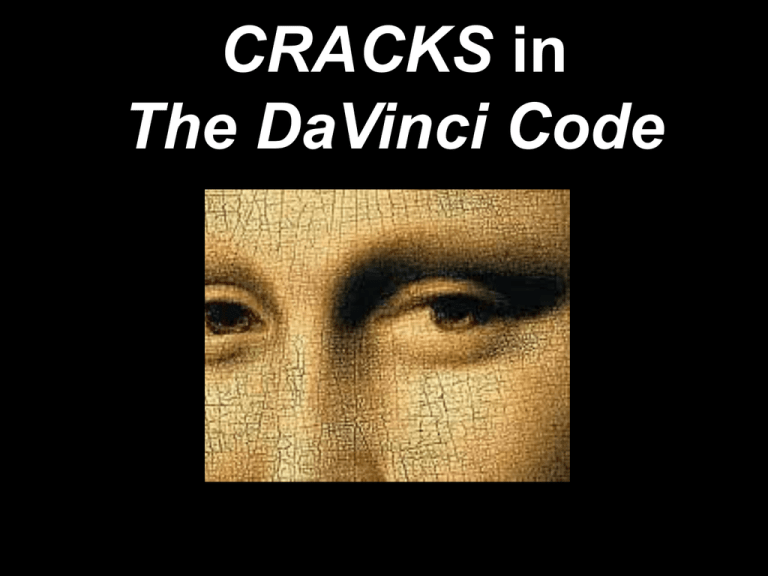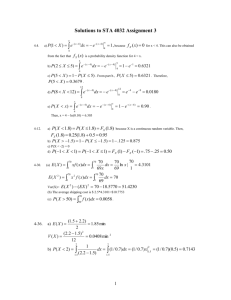PowerPoint version of CRACKS in The DaVinci Code
advertisement

CRACKS in The DaVinci Code CRACKS The fictional conspiracy theory offered in best-seller The DaVinci Code has now captured the popular imagination. Sitting in a local coffee shop you could easily hear the following conversation, “Wow, Jesus was married?” “I never knew that!” and “What if it’s really true?” Intermixed with the curiosity seekers, may be others quietly concerned about the impact of these “new revelations” on the nature of faith, hope, and the resurrection. In what appears to be a popular work of historical fiction, Dan Brown tells a fantastic tale of murder, mystery, and of secret societies whose sole reason for existence is to cover up a secret—the marriage of Jesus of Nazareth to Mary Magdalene. As the story goes, Mary and Jesus had a “love child” named Sarah, who was smuggled out of Palestine to become ancestress of a dynasty of French kings. Now, if these outrageous assertions are true—and they are not—then many of the foundational truths of the Bible should be called into question. In what follows, we will briefly consider how to go about cracking The DaVinci Code by means of the acrostic: CRACKS. CRACKS Conspiracies, Everybody loves’em Brown says so at least three times in his own book. But conspiracy theories are notoriously “cracked.” You see it’s virtually impossible to keep everything and everyone under wraps. For those who wonder if it might be possible—given enough power—we can simply ask, “Ever heard of Watergate?” I’m not a crook!! CRACKS Reality versus “Facts” Just the facts Mam! The deceit of The DaVinci Code begins with the very first word—FACT. In what follows, Brown primes the pump for an apparently inexhaustible stream of hoaxes, myths, and distortions. The most important claim—regarding the existence of certain corroborating documents supposedly discovered in a French museum—has long been exposed as a hoax in various French books and a BBC documentary. The secret Priory of Sion, which was supposedly founded in Jerusalem in 1099 AD, was actually registered in France in 1956. And the so-called Sangreal documents simply don’t exist in fact or in fiction. The reality is that all of the “facts” listed are what he acknowledges are "fabricated" facts (2). CRACKS Apostles and Marriage Where’s John? Now, when we look for verses that directly say that Jesus was never married, there are none to be found. That is because this idea never entered the minds of the Apostles. However, when addressing the subject of marriage for the Apostles themselves, the supreme example of Jesus is not even mentioned (1 Corinthians 9:5)(1). One of the more infamous notions of the book is that Leonardo DaVinci encoded clues to this scandalous secret in his art including the Last Supper where Mary Magdalene supposedly occupies the place of the Apostle John. But if this were really true, where was the Apostle John among the twelve? CRACKS Canon Confusion Another erroneous idea is that the church selected and edited certain books for inclusion in the Bible and rejected and destroyed others for political reasons. Thus the Roman Emperor Constantine is accused of assembling the Bible by rejecting and suppressing the various apocryphal books. The fact is that even the non-orthodox historian Eusebius reported that the accepted books of the Bible, or the canon, were known and in use in all the centers of Christianity well before this time. Today we have tens of thousands of manuscripts to give indisputable witness to this fact. Though many imagine that the church was the mother and judge of the canon; historically it was merely the child and witness of the canon. CRACKS Know History Though this book in written in the genre of “historical fiction,” it is actually a mix of distorted details and phony facts. For example, Brown characterized the affirmation of the deity of Christ by the first great Christian council of Nicea as a “relatively close vote.” In fact, the vote was 300 to 2! Brown also promotes some extremely perverted interpretations of art and architecture, which are universally rejected by art critics and historians. He also distorts the lives of many historical figures: DaVinci, Botticelli, Isaac Newton, Constantine, and the Templar Knights. And to set the stage for his story, he claims that the Merovingians founded Paris. Well, Paris was actually was founded seven centuries earlier. CRACKS Scripture The scriptural account of the life, death, and resurrection of Jesus is well supported by verifiable facts from secular history (2). The internal evidence in the scriptures that Jesus never married is beyond dispute. In sharp contrast, the DaVinci Code is based on long-exposed hoaxes and cultural myths. CRACKS Conclusion: The success of this page-turning work of fiction has now provided Dan Brown a platform from which to take swipes at the Church and the Bible, only to endorse “sacred” pagan sexual rituals, Gnosticism, and the postmodern dogma that “every faith in the world is based on fabrication" (3). In the just released movie (5-19-06), the by-line is “seek the truth.” Hopefully in seeing these CRACKS some will see through Dan Brown’s fabricated facts to seek The Truth in Jesus Christ (John 14:6). The DaVinci Code Has Many CRACKS Conspiracies, Everybody loves’em Reality vs “Facts” Apostles and Marriage Canon Confusion Know History Scripture The DaVinci Code Coming to a Theater near you! Know the facts, Know the CRACKS CRACKS Glossary of terms and names: •Apocrypha: a type of literature often written under a false name and about things that may or may not be true. We might call this “literary identity theft.” •Constantine: Constantine the Great (274-337AD), Roman emperor (306-37), the first Roman ruler to be converted to Christianity. •Council of Nicea: The first great council of the Christian church (324AD) held in Nicea in with the purpose to show unity about certain key doctrines. One of the more important results from this counsel was an agreement explaining how the already accepted doctrine of the deity of Christ was related to the humanity of Christ. In short, Christ was fully God and fully man. In contrast, Gnostics claimed he was essentially spiritual and only appeared to be human. •Gnosticism: A non-orthodox religious movement that peaked in the second century and which claimed that the physical world was inherently evil, and taught that one escaped the physical to the spiritual through secret knowledge, or Gnosis. •Holy Blood, Holy Grail: A book by Michael Baigent, Richard Leigh, and Henry Lincoln who brought a lawsuit against Dan Brown for “lifting the whole architecture” for The DaVinci Code out of their book. CRACKS Glossary of terms and names: •Mary Magdalene: One of the first followers of Jesus (Luke 8:2). She was never regarded as one of the Apostles in the Bible or by any other historical source. •Merovingians: A French royal family name used in The DaVinci Code that has nothing whatever to do with the premise of the book. •Priory of Sion: A supposedly ancient secret society that was actually registered in France in 1956, for which historical claims were exposed as a hoax by French and BBC researchers. •Sangreal documents: Fictional documents described in The DaVinci Code that supposedly reveal that there was a bloodline (sang) for the royal (real) family of the Merovingians. •Templar Knights: A military-religious order that protected pilgrims in travels to the Holy Land and later became a banking institution. References: 1. The DaVinci Code: Fact or Fiction, by Hank Hanegraaff and Paul L. Maier. 2. Video, Who Is This Jesus?: Examining the Truth about Jesus, D. James Kennedy, and Coral Ridge Ministries. From contemporary, secular history we can learn at least twenty five different facts about the life of Jesus that confirm the New Testament historical account of his life. 3. The DaVinci Code, by Dan Brown, Doubleday, NY, 2003, p.341.







